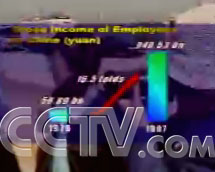 A recent report from the Finance Ministry suggests a reform of the present personal income tax system, raising the starting point of taxation and lowering the tax rate on middle income people. On what basis does the ministry come up with such a report? Who will be the beneficiary of the proposed reform? A recent report from the Finance Ministry suggests a reform of the present personal income tax system, raising the starting point of taxation and lowering the tax rate on middle income people. On what basis does the ministry come up with such a report? Who will be the beneficiary of the proposed reform?
The Scientific Research Institute of the Finance Ministry recently publicized a report on Income Distribution of Chinese Citizens and the Adjustment of Fiscal and Tax Policies, suggesting a reform in the present personal income tax system: increasing the starting point of taxation and lowering the tax rate on middle income earners. China’s Law on Personal Income Tax was established in 1980. The law stipulates that the starting point for taxation is 800 yuan per month. Now with people’s income rapidly increasing, this stipulation has been debated for years. The old regulation no longer holds water. This recent report by the Finance Ministry simply makes this hot topic even hotter.
Over two decades ago, the 800 yuan per month starting point for taxation was 10-20 times of people’s monthly income at the time. It helped to regulate the disparity between people of different incomes and displayed fairness in the society. Today, the unchanged taxation point expanded from a minority of high-income people to include the majority of urban residents. The fairness of personal income tax in fact lies not only in the change of the starting point of taxation; it needs the direction of a scientific system so that it can change with the times and play its due role in society.
Although the reform on personal income tax hasn’t been turned into a reality, many people are already starting to imagine how their income is likely to be affected by it. The call for raising the starting point of taxation on personal income mainly comes from cities such as Beijing, Shanghai and Shenzhen where people enjoy the highest income in China. What is the present personal income in these comparatively developed areas, and is the 800 yuan starting point of taxation still compatible with this level of income?
Li Aizhen is an employee in the commercial sector and lives in the Haidian District in Beijing. As a sample of the survey on family life of urban residents, she keeps a detailed record of the daily expenditures of her family.
Li’s monthly income is just over 1000 yuan, her husband earns less than 1500 yuan. With not much income, she has to count every yuan and make every cent count.
“Large supermarkets often have special offers and we usually pay special attention to this information so that we can buy things at cheaper prices,” said Li Aizhen, Beijing resident.
According to the Law on Personal Income Tax, the starting point of taxation is 800 yuan. As an economically developed area, the actual practice is 1,000 yuan in Beijing. In line with this stipulation, Li’s family has to pay about 100 yuan tax every month. The sum is not crippling for the family, but having an extra 100 yuan per month would be very useful.
“The water charge is rising; originally it was 0.12 per ton, now it is 2.9 yuan, increased by more than ten fold. I can use the sum to pay for necessary expenses for my family if I don’t have to pay the tax. That means I can save part of the family’s expenses,” said Li Aizhen.
 Families like Li’s are numerous. According to the National Statistics Bureau, employees with less than 800 yuan of monthly salary account for 47.2 percent of the total employed in 2002. In 1992, the number was 99 percent, only 1 percent of people earned more than 800 yuan per month. At that time, 800 yuan was a high salary and taxation at 800 yuan was reasonable. But today, 800 yuan is a low income line. That means, taxation starting at 800 yuan is a heavy burden to these low-come families. Targeting low income people is certainly not the initial aim of the taxation law.
Families like Li’s are numerous. According to the National Statistics Bureau, employees with less than 800 yuan of monthly salary account for 47.2 percent of the total employed in 2002. In 1992, the number was 99 percent, only 1 percent of people earned more than 800 yuan per month. At that time, 800 yuan was a high salary and taxation at 800 yuan was reasonable. But today, 800 yuan is a low income line. That means, taxation starting at 800 yuan is a heavy burden to these low-come families. Targeting low income people is certainly not the initial aim of the taxation law.
Right now, the tax rate in China is divided into 9 categories from 5 percent to 45 percent. The report from the Finance Ministry also suggests that the categories of tax rate be reduced, the disparity of different tax rates be enlarged and the tax rate of those with 3000-5000 yuan of monthly income be cut. What are the earnings and consumption of these middle income citizens, and what is the monetary result if their tax rate were to be cut?
Fifty-year-old Liu Chunshan is a civil servant, also a participant in the survey on family life of urban residents in Beijing. His monthly salary plus subsidies equal 3100 yuan. It is a high level of earning among civil servants. But this income is only enough to afford his sons’ rent and tuition in Denmark.
Though 70 percent of the family’s income is used to afford his son’s overseas expenses, Liu Chunshan is hoping to buy a house of his own with the increased spendable income after his son comes back from abroad. Liu said that if the tax rate were to be lowered, it would mean that his dream will come true sooner.
“If the tax rate is to be reduced, I can not only afford my son’s education abroad but also think of fulfilling some of my long-cherished dreams,” said Liu Chunshan, Beijing resident.
In 1980 when the Law on Personal Income Tax was enacted, the ordinary citizen’s monthly salary was about 30-40 yuan, the highest about 100 yuan. Only a minority of people and some foreign employees were able to meet the then stipulation of taxation at 800 yuan. Things have changed a lot over the past two decades.
The salary of employees across the country has increased rapidly from 1978 to 1997. In 1978, the gross income revenue was 56.89 billion yuan, in 1997, the number was 940.53 billion, an increase of over 16 times. The average increase rate year on year was 15.9 percent. The average per capita annual income in 2001 was more than eight fold that of 1985, increased by 9722 yuan, up 15.4 percent year on year. The components of salary have drastically changed as well. Bonuses, the most flexible part of the salary, have increased the fastest; with annual growth over 27 percent, accounting for 2 percent in 1978 and more than 15 percent in 1997, an increase of over 13 percent.
At the same time, the overall income of urban residents has been increasing quickly. In 2001, the average annual dispensable income of urban residents was 6860 yuan, an increase of 5484 yuan over 376 yuan in 1989. Accounting for price increases, the actual annual growth rate was over 7 percent. In the nine years from 1989 to 1999, the increase of annual dispensable income of urban residents grew at 16.25 percent; the annual yearly salary of employees increased by 16.33 percent, while annual expenditures for consumables rose by 15.33 percent.
The fact is, with the rapid growth in personal income, economically developed cities have developed different practices in taxation. Beijing starts at 1000 yuan, Zhuhai 1400 yuan and Shenzhen 1700 yuan. Members of the Chinese People’s Political Consultative Conference earlier proposed that it would be proper to start personal income tax at 1500 yuan per month. Many people saw it as a sign to readjust the personal income tax system when the scientific research institute of the Finance Ministry publicized the report.
“In the text of the report made by the scientific research institute of the Finance Ministry, we never specify the actual number. The basic idea of the report is to suggest that the starting point of personal income tax be raised according to proper and pertinent conditions,” said Jia Kang, director of Scientific Research Institute of Finance Ministry.
In the same report, it is suggested that a low tax rate policy be carried out among those earning 3000-5000 yuan per month. What is the foundation for the adjustment? Is this level to be considered China’s middle income class at present and in the future? Mr. Jia said that these questions are still open for discussion.
“Low tax rate and the raising of the starting point for taxation actually are both a kind of guideline. They aim to lower the tax rate at a certain level on people of a certain income; it is a policy to increase people’s actual spendable income,” said Jia Kang.
Experts argue that people with 3000-5000 yuan of monthly income tend to concentrate on knowledge and capital -intensive industries. These industries are playing an increasingly important role in the national economy, and these people are the main force driving future consumption. A low tax rate stimulates them to spend, which enhances the overall consumption of the whole society and serves an impetus for economic development.
|